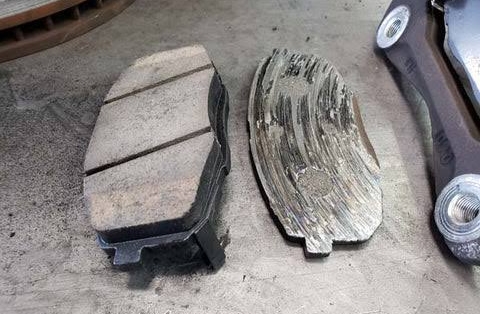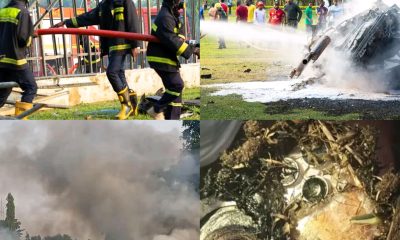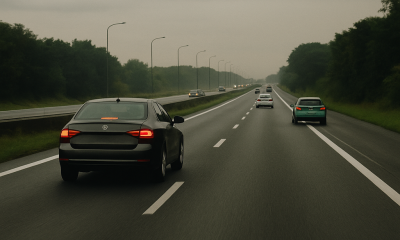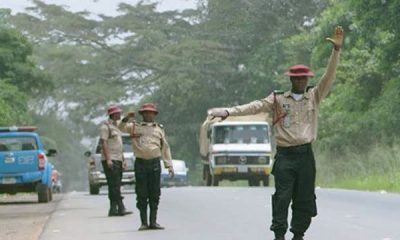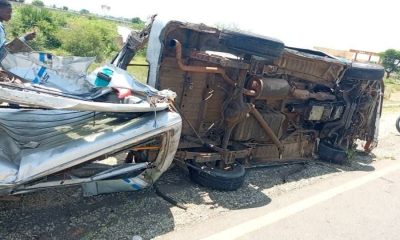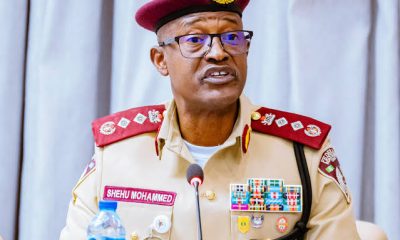Crash News
Breaking: 12 Feared Dead as Kano Line Bus Collides with Fuel Tanker

Tragedy struck again on Nigeria’s highways Sunday afternoon as a Kano Line passenger bus collided head-on with a fuel-laden tanker along the busy Kano–Zaria Expressway, claiming the lives of at least twelve passengers and injuring several others in one of the year’s most devastating crashes.
Also Read: FRSC Reports 6,858 Road Crashes, 3,433 Deaths in Nine Months
According to eyewitness reports and preliminary information from the Federal Road Safety Corps (FRSC), the accident occurred around 2:45 PM near the Tamburawa axis of the highway, a notorious black spot known for reckless overtaking and poor lane discipline by both commercial and heavy-duty drivers.
“It was a fiery scene. The tanker burst into flames immediately after the collision, trapping many inside the bus,” a survivor, Malam Sulaiman Adamu, told RoadKing.ng in a trembling voice. “We heard people screaming for help, but the fire spread too quickly. Only those seated near the exit managed to escape.”
According to FRSC Kano Sector Commander, Ibrahim Abdullahi, preliminary investigation revealed that speeding and wrongful overtaking were the primary causes of the crash.
“The Kano Line bus was reportedly overtaking another vehicle when it collided head-on with an oncoming fuel tanker. Both vehicles caught fire instantly, leading to multiple fatalities,” Abdullahi said.
The impact of the collision was so intense that the bus was completely gutted, leaving only its metallic frame. Passersby and nearby residents rushed to the scene, but the inferno made rescue efforts nearly impossible until firefighters from the Federal Fire Service arrived about 25 minutes later.
Emergency response teams, including personnel from the FRSC, Fire Service, and NEMA (National Emergency Management Agency), were swiftly mobilized to the site. However, the magnitude of the fire hampered initial rescue operations.
An eyewitness, Aisha Umar, who operates a kiosk along the highway, said she saw a massive explosion that shook nearby buildings.
“The sound was deafening. I saw a thick ball of fire and smoke rising into the sky. People were running in panic,” she said. “When the fire subsided, I counted several bodies being carried away by the FRSC officials.”
Authorities confirmed that twelve persons were burned beyond recognition, while seven others sustained various degrees of injuries and were rushed to the Murtala Muhammed Specialist Hospital in Kano for treatment.
This latest crash adds to the growing list of fuel tanker and commercial bus accidents in Northern Nigeria this year. In the past six months alone, the Kano-Zaria Expressway, Kaduna-Abuja Road, and Bauchi-Gombe Road have recorded over 120 deaths, according to FRSC data.
Experts have repeatedly blamed the alarming statistics on:
- Driver fatigue and recklessness
- Over-speeding on narrow lanes
- Mechanical failure and poorly maintained vehicles
- Weak enforcement of roadworthiness laws
Transportation safety analyst, Engr. Usman Garba, speaking with RoadKing.ng, described the crash as “avoidable,” calling for immediate enforcement of stricter speed limiters and rest periods for long-distance commercial drivers.
“We cannot continue to normalize deaths on our highways,” Garba said. “It’s time the FRSC and transport unions jointly regulate driver behavior with technology — cameras, trackers, and AI-based speed governors.”
Among the victims were traders, students, and civil servants returning from a weekend trip. One of the survivors, Hassan Bello, narrated how he narrowly escaped death:
“I was seated at the back. I felt the impact and immediately jumped out through the window. A few seconds later, flames covered the whole bus. Those who couldn’t get out screamed helplessly.”
For families of the victims, the incident has brought untold grief. At the Kano State Hospital morgue, several relatives gathered weeping, waiting to identify charred remains.
“My younger brother was on that bus,” said Fatima Musa, sobbing. “He called me before boarding, saying he’d be home by evening. Now I’m here to collect his body.”
Kano State Governor, Abba Kabir Yusuf, described the crash as “a heartbreaking reminder of the urgent need for highway reform.”
He directed the State Emergency Management Agency (SEMA) to provide immediate support to the families of the deceased and pledged that the government would cover burial expenses for all identified victims.
“We must prioritize safety over speed. I have directed that commercial drivers under the Kano Line fleet undergo fresh training and certification before resuming operations,” the governor said in a statement released Sunday night.
RoadKing Analysis: Why These Crashes Keep Happening
RoadKing.ng’s investigative review of past accidents involving fuel tankers and long-distance buses revealed three recurring patterns:
- Negligence and poor maintenance — many transport companies skip vehicle checks.
- Exhausted drivers — long hours without rest, often induced by pressure to meet daily trip targets.
- Weak highway monitoring — few patrols and no functional surveillance on high-risk routes like Kano–Zaria.
Experts believe that integrating digital vehicle inspection systems, and incentivizing modern safety compliance technologies (like the proposed TankSafe™ casing) could significantly reduce casualties.

